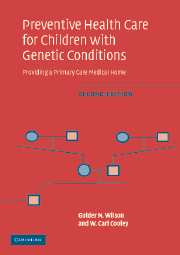Book contents
- Frontmatter
- Contents
- Preface
- Glossary of genetic and molecular terms
- Part I Approach to the child with special needs
- 1 Approach to the child with genetic disease
- 2 Providing a primary care medical home for the child with a developmental disability
- 3 Approach to preventive management
- Part II The management of selected single congenital anomalies and associations
- Part III Chromosomal syndromes
- Part IV Syndromes remarkable for altered growth
- Part V Management of craniofacial syndromes
- Part VI Management of connective tissue and integumentary syndromes
- Part VII The management of neurologic and neurodegenerative syndromes
- Part VIII Management of neurodegenerative metabolic disorders
- References
- Index
2 - Providing a primary care medical home for the child with a developmental disability
Published online by Cambridge University Press: 29 January 2010
- Frontmatter
- Contents
- Preface
- Glossary of genetic and molecular terms
- Part I Approach to the child with special needs
- 1 Approach to the child with genetic disease
- 2 Providing a primary care medical home for the child with a developmental disability
- 3 Approach to preventive management
- Part II The management of selected single congenital anomalies and associations
- Part III Chromosomal syndromes
- Part IV Syndromes remarkable for altered growth
- Part V Management of craniofacial syndromes
- Part VI Management of connective tissue and integumentary syndromes
- Part VII The management of neurologic and neurodegenerative syndromes
- Part VIII Management of neurodegenerative metabolic disorders
- References
- Index
Summary
Health care providers in the primary care medical home are uniquely positioned to identify and initially evaluate developmental differences in young children. They are familiar with aspects of the family history and with psychosocial factors that may place a child at higher risk for developmental delay. Primary health care providers are aware of birth events and usually provide for the care of newborns. For those developmental disabilities that are identifiable prenatally or at birth or that result from perinatal complications, early detection is possible. Finally, and most important, the primary care medical home provides a headquarters for longitudinal anticipatory care during which alterations in developmental course can be recognized, investigated, and managed. For most parents, the primary care physician is the first and most trusted respondent to their worries or concerns about their young child's development. It is important that all primary care physicians feel comfortable with this responsibility, confident in their skills at developmental surveillance and screening, clear about the resources for intervention and further evaluation, and knowledgeable about management, care coordination and advocacy.
This chapter provides an overview of the approach to the child with a developmental delay or disability from the perspective of the primary care medical home. Taking a generic approach that is intended to complement the specific guidelines of other chapters, we review the epidemiology of developmental disabilities. Developmental screening in the medical home is discussed, with guidelines for referral to community-based agencies and for further medical evaluation.
- Type
- Chapter
- Information
- Preventive Health Care for Children with Genetic ConditionsProviding a Primary Care Medical Home, pp. 21 - 32Publisher: Cambridge University PressPrint publication year: 2006



